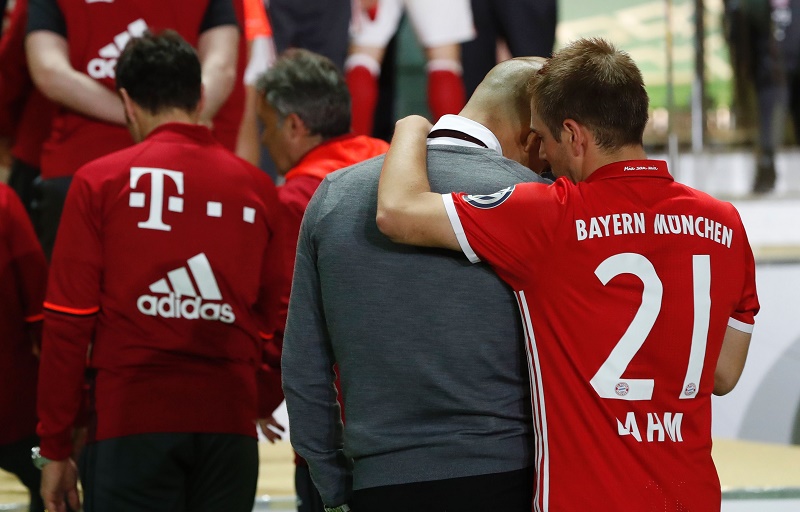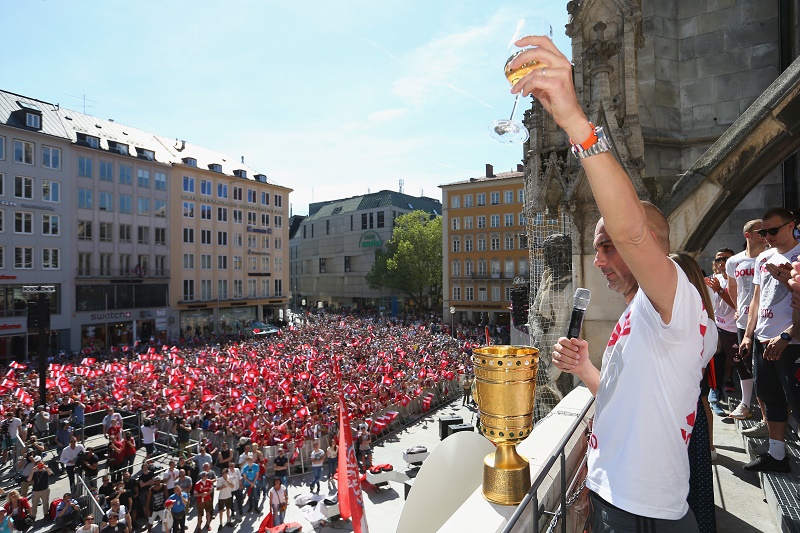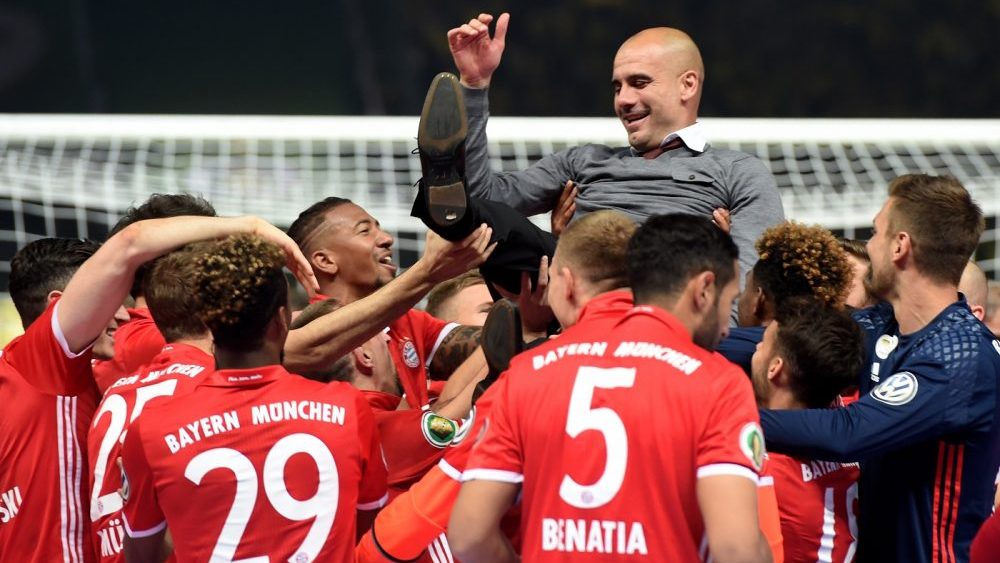What will remain of Pep Guardiola?
“Titles are numbers”, Guardiola said after the game and added, that his experiences from the last three years means so much more to him. When the star manager took over a team at its peak, expectations were high. FC Bayern replaced the treble-winning Jupp Heynckes with the man who shaped FC Barcelona into the best team in club football.
A European Supercup, the FIFA Club World Cup trophy, two DFB-Cups and three Champions League semifinals as well as three Bundesliga titles later, it’s time to draw a final conclusion.
Guardiola‘s merits
The Catalan had to battle many setbacks. In the first year there were doubts concerning his system at least from parts of the team. A lot of injuries made his job even harder. He faced this on a tactical level. FC Bayern became more dominant and more flexible in the last three years. When Ribéry and Robben were out injured in the second season, Guardiola changed the style of play towards a more central focus. Finishing the season as league champions, losing the DFB Cup semifinal in a freakish way and bringing a nearly unbeatable Barcelona side to its limits. Temporarily he had to make do without any centre-backs, but the manager pulled Kimmich out of his hat.
The flexibility in the squad is to be owe to the Catalan coach. It’s not just that players can play multiple positions. Guardiola also taught them various systems in his three years. The team is able to play different formations within few minutes. This made FC Bayern pretty much unpredictable during Guardiola’s tenure. Even though the style of play was a little more predictable under the more pragmatic Pep in his final season, the positional play was just too variable for most opponents.
The players were constantly talking about having several solutions for different scenarios in a game. While being dependent on one working system under Heynckes and van Gaal, Bayern could win tight matches due to this variability. Pep Guardiola can read a game and change its course with small adjustments in a few seconds. He’s able to do so because he’s been analyzing the next opponent for days. These specific and effective adjustments for opponents have frequently gained FC Bayern the decisive edge in matches that could’ve gone either way. It didn’t matter if the counterpart was from Madrid or Darmstadt.
What also remains from Guardiola is individually improving nearly every player. David Alaba, Robert Lewandowski, Rafinha, Jérôme Boateng and the already 32-year old Philipp Lahm are the prime examples. Even youngsters like Kimmich or Coman have been integrated into the team with a lot of trust. Both paid it back with big performances against Juventus or Borussia Dortmund. Boateng’s build-up has massively improved in the past three years. The international has repeatedly said how important Guardiola was for this development. Alaba evolved into an allrounder. Centre-back, left-back, half-back, defensive midfielder, central midfielder… The Austrian could probably also play goalkeeper. There might not be another player on this planet who can play this many positions without losing the tag of being world-class. Guardiola has a fair share in this.
The Catalan has a very special relationship to Philipp Lahm. At the beginning of his tenure Guardiola called him the most intelligent player he’s ever coached. After the cup final on Saturday he added, that he’s never seen a right-back who can dominate a game as much as the Bayern captain. He put him on the same level as Beckenbauer, Gerd Müller and Hoeneß. Even such an experienced player like the 32-year old benefited from Guardiola. Games in midfield as well as an innovative hybrid role as right-back and defensive midfielder lifted Philip Lahm on another level, which was unthinkable three years ago. However the 45-year old even improved players who didn’t always play a massive role. Rafinha for instance, has seen remarkable improvements in his passing and positional play.

(Photo: Odd Andersen / AFP / Getty Images)
Another merit of Guardiola is that the Bundesliga and the national team have benefited from his work. Many Bundesliga clubs have tried to emulate elements of his system and have improved tactically. The most fitting example is Thomas Tuchel who has lifted Borussia Dortmund to another level in just one year. Guardiola was his role model and navigation point. Especially the national team has benefited greatly. When comparing the current style of play with the one a couple of years ago, it’s obvious to see.
It might be his massive influence which makes the Catalan’s term a success. However, and this is rather important, Pep Guardiola also benefited from the Bundesliga and FC Bayern. He evolved as a manager, found solutions for a league that’s based on pressing and established German elements in his philosophy. For example long balls with their ability to bypass the midfield were suddenly a weapon of his team.
Losers of Guardiola’s era
Obviously there were also losers in the last three years. Possibly the biggest one being Mario Götze. Following a very good first year he had a lot of bad luck and personal inabilities. It should also be noted that Guardiola hasn’t found a fitting position for the World Cup winner. If Götze were to leave FC Bayern, both sides should be criticized. Apart from Robert Lewandowski and to a lesser extent Claudio Pizarro the strikers didn’t have it easy with the manager. Gomez was discarded in the first week of the Catalan’s tenure and Mandzukic left on bad terms with Guardiola. In Schweinsteiger’s case it’s hard to call him a loser. According to media reports it was his wish to leave the club but he never improved under Guardiola. The Bayern legend was only missed as a leader in the changing room due to his injury problems and his recent sub-par performances.
The own youth academy is also a loser. This isn’t the manager’s fault though. He definitely tried it with Hojbjerg, Gaudino and several other players. Hojbjerg even featured in the cup final in 2014. However not a single academy player made it under Manchester City’s future manager. The medical staff was a controversial subject too. Resulting in Hans-Wilhelm Müller-Wohlfahrt leaving the club on his own accord. This led to a massive unrest in the media, which on a side note isn’t a winner in the last three years either. Guardiola didn’t give many interviews and never really got on with the media landscape. Especially in terms of media relations and controlling the work load of his players the Catalan can be criticized.
Further losers only appear because of injuries. Where Holger Badstuber would be without his bad luck, can only be imagined. Medhi Benatia too, who hasn’t had an overly successful time at the record champion so far. The Moroccan went out injured when he just became Boateng’s regular partner. Sebastian Rode’s situation is specific. He always delivered solid performances when needed, but his quality didn’t suffice for more.
Making the impossible possible
When FC Bayern won the treble in 2013 it was unthinkable that this team could get even better. With the success people forgot that Heynckes didn’t only have a fair amount of luck, but also a team at its peak. Guardiola had to gradually replace the former protagonists. Robben, Ribéry and Schweinsteiger were increasingly injured and in parts dropped in quality.
Guardiola managed that the team was still a powerhouse in European football after being past its best. Schweinsteiger’s importance decreased through tactical adjustments. The absence of Robben and Ribéry was intercepted by Cost and Coman. Furthermore he dealt with injuries through the aforementioned flexibility. The squad was even better than in Heynckes’ reign, Guardiola created a lot out of it though. Expectations with him were enormous even through all these factors. At least in the media many have measured him by the Champions League title only.
The streak of this Bayern team was extended with and especially by the manager. In a space of three years Guardiola made it even better. This achievement culminated in games like 7-1 against Roma, the 5-1 against Arsenal. Particularly the 5-1 against Borussia Dortmund was an emotional highlight in Guardiola’s time. Also unforgotten a 3-1 victory at Manchester City, when the team dominated the home team in its first year. Last autumn it looked like Guardiola has reached a certain satisfaction. It might’ve been the phase of his time at Bayern where he felt his job was done and made the decision to take on a new challenge in the upcoming season.
Statistics
When you compare the treble team of Jupp Heynckes to Guardiola it shows that he had a successful time here. Back then Munich averaged 60.6% possession and a passing accuracy of 87.3% in the Bundesliga. They allowed 8.2 shots per game, compared to having 17.1 shots themselves. 2.8 goals scored and 0.5 goals against per game round up the most important statistics for the treble season. In the current season FC Bayern average 66.4% possession, a passing accuracy of 88%, 18.4 shots for and allow 7.5 shots per game against them. Because of poor finishing in the second half of the season they only scored 2.35 goals per 90 minutes. The only statistic that is worse compared to the 2012/2013 campaign. Only in Guardiola’s first year they could match the benchmark by Heynckes, when they also scored 2.80 goals per game. However the Catalan stabilized the defenese and found good solutions against counter attacks despite his attacking style. 17 goals conceded are a Bundesliga record.
In 161 games as Bayern manager Guardiola averaged 2.41 points per game. At Barcelona he had 2.36 points per game in 247 games. The Catalan only lost 21 out of 161 matches. 16 ended as a draw and reaching 124 victories. He used 44 players. FC Bayern only missed four possible games with him at the helm. They couldn’t reach the cup final in 2015 and also missed three Champions League finals. One striking fact is, that 11 of Guardiola’s 21 losses came in the decisive phases between April and March. The reason should be viewed from different perspectives. Some losses were a result of bad luck with injuries and motivational problems, others of general tough luck and personal errors. At least the latter applies to both games against Real Madrid, where Guardiola had his share. This doesn’t take away anything from his successful time at Bayern though. With 2.52 points per game he is the best manager in Bundesliga history.
Guardiola’s favorite opponents in Germany include Cologne (4 games, 4 wins), Hannover (7 games, 7 wins), Hertha BSC (6 games, 6 wins) and Werder Bremen (7 games, 7 wins). Gladbach (6 games, 2 wins, 2 draws, 2 losses) and Borussia Dortmund (11 games, 6 wins, 1 draw, 4 losses) are two of his most uncomfortable foes. In four games against SC Freiburg Guardiola got two wins, one draw and one loss, which is rather impressive.

(Photo: Alexander Hassenstein / Bongarts / Getty Images)
A conclusion
One could really draw a résumé that Guardiola made the seemingly impossible possible. He refined Bayern tactically, improved specific players and didn’t only extend the streak of Bayern’s best team of all time, he also made them a better football team. The Bundesliga’s football and the national team changed significantly because of his ideas. What’s left is a team that has different solutions for many on-pitch scenarios. Even Carlo Ancelotti will benefit from the Catalan’s work. A Bayern squad has never been this flexible. Altogether Guardiola had a nearly perfect time at FC Bayern. You cannot plan a Champions League title and above all you cannot expect one. He didn’t have the pleasure. The few justified points of criticism are overshadowed by all the positive aspects and I look back with a lot of gratitude to the successful era of Pep Guardiola at FC Bayern. Even without a Champions League title I will cherish these three years for a very long time. Thanks Pep.









